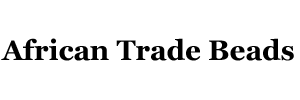If you love beading, and specifically if you have a fascination with ethnic beads and jewelry, working with African trade beads is a must. We’ve all, at the very least, have heard the term thrown around at trade shows and bazaars. Maybe we have friends who use trade beads in their work, or we’ve always admired that one exotic booth at the Gem and Jewelry show which is run by the local African bead trader. Well, you’re in luck…this new blog is devoted to entirely to those beautiful things we call African trade beads. So my first post will cover the basics. What exactly are African trade beads?
The phrase “trade beads” typically refers to any beads collected, traded, and/or sold in Africa, most commonly Western Africa. This would include European glass beads brought to Africa, many Indian beads which also found their way to Africa, African glass, stone, metal, and sandcast beads, and often times other more modern glass beads from India or China. But this is not what the term “trade beads” was originally meant to mean.
Originally, the term “African trade beads” refered only to beads that were used for trading, or exchanging goods. These beads were not originally meant to be worn, or used as an aesthetical beauty product. In other words, many of the glass beads that come from Africa today are not traditional African trade beads. And to confuse you a bit more, just because certain beads are from Africa, and may even be a bit older, it does not mean they are trade beads, because not all old beads were used for trading.
Only a very small percentage of the so-called “trade beads” in today’s market are genuinely trade beads, to traditional standards. Most of today’s trade beads are made specifically to be worn. And although they are beautiful, carry a rich history, and may even be decades old, it is important to note that they are not the original “trade beads.” Original trade beads, such as Venetian made Millefiori trade beads, are often more expensive than modern-day trade beads.
Other examples of trade beads, including the non-genuine kind of trade beads, include Hebron glass beads, French cross beads, Snake / Zula vertabrae beads, Chevron beads, and others.
